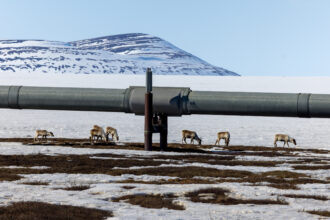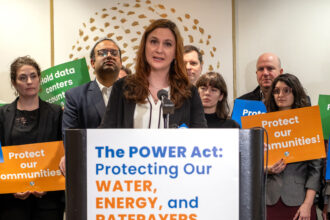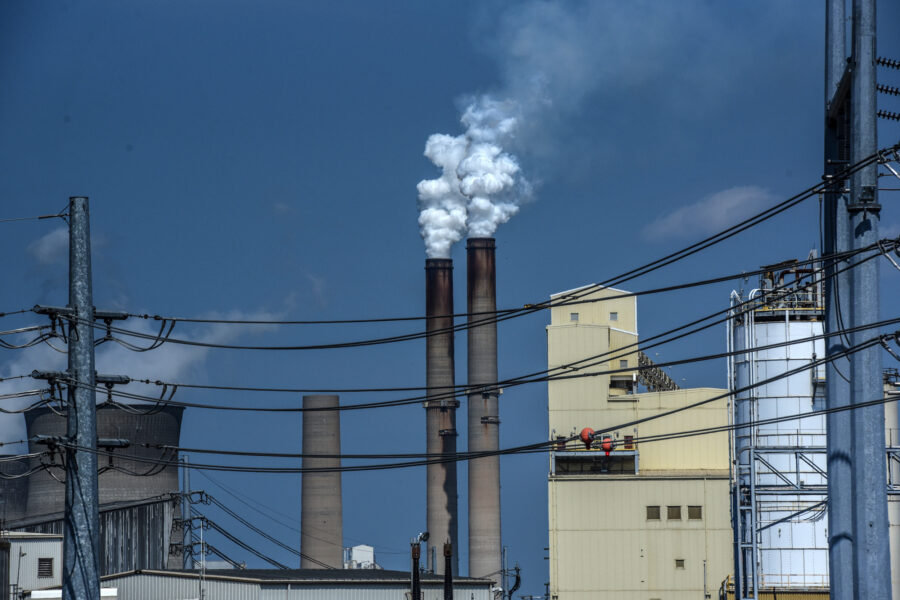The United Nations climate process is an obsession with a subset of the environmental community, the only route by which global warming can be tackled on the scale it requires. It can be vague and confoundingly policy heavy, with jargon and acronym-laden language impenetrable to outsiders.
That process is now coming to a defining moment. With the Obama administration moving rapidly to turn the old Bush climate policy on its head, it would appear that the stars are aligning for a global climate treaty to be crafted with the United States on board, an accomplishment that escaped the Kyoto Protocol.
However, the road to Copenhagen goes through the American Midwest, and it appears to get rocky.
Senators from Midwestern manufacturing and coal-using states have pushed back on the idea of an international climate treaty. As dirty industry leans on senators whose states are facing rising unemployment and shuttered factories, the debate of climate vs. economy is still alive and well, despite the appointment of Van Jones as a White House adviser on green jobs and reports like McKinsey‘s outlining how stabilizing emissions has a close to net zero cost.
The only way for the Obama administration to pull together the votes to bring the United States on board for Copenhagen may be by tying it to a successful push for clean energy in the Midwest, and that hinges largely on the work of young people, labor groups, and innovative clean energy projects in the region.
Washington: Midwest’s Mind is Made Up
The Kyoto Protocol was never brought to the U.S. Senate, where a two-thirds vote is required to pass a treaty. A resolution aimed at attacking the treaty had passed 95-0, and the only senator that Vice President Al Gore thought he could bring on for sure was the late Sen. Paul Wellstone (D-Minn.).
Now, it appears, as environmental and industry lobbyists head to the Hill to clash over a climate treaty, there is a growing strand of Washington thought that promotes delaying domestic legislation until after the Copenhagen conference.
The Guardian recently published an article titled, “Barack Obama May Delay Signing up to Copenhagen Climate Change Deal” highlighting the role of “as many as 15 Democratic senators who represent ‘rust belt’ states dependent on coal mining, steel production and heavy manufacturing, all big emitters of carbon.”
I sat through a talk at the Brookings Institution, a heavyweight beltway think tank, where Carlos Pascual said: “We can’t let the calendar defeat us.” He urged a longer-term outlook, due to the same roadblock role of Democratic senators from the rust belt and the Midwest. It was a textbook portrayal of Washington ‘conventional wisdom’ being established on an issue. The concept that the political calculus may shift in the Midwest was never even considered, let alone the role of the emergence of a broad-based citizen’s movement on global warming.
Two days before, I was in the middle of the largest lobby day on climate in history, as the participants of Power Shift 2009 – including student leaders from each of the states those senators represent – came to visit their representatives, capping off an extraordinary conference where participants included a seemingly endless array of administration officials.
Yet, in Washington, the global climate treaty is seen as a matter for experts, lobbyists, and academics, not citizen activists.
Many large US-based environmental organizations have siloed their staffs, with an international climate team staying focused on the UN Process, while field teams focus on domestic legislation. Almost all of them rely on a skeleton crew at the Climate Action Network, where a few staff members in a small walk-up office juggle the process both of developing a coherent policy position for environmental organizations at the UN level, as well as coordinating joint communications, southern capacity building, and logistics.
The big environmental groups are now working on a plan to synchronize their international and field programs, but is it too late to influence a conference in December, where many of the decisions will be made in the lead up?
Copenhagen is likely the last opportunity where Europe will invest its political capital in a global treaty, if the United States does not join. The Midwest is still the linchpin, even if Obama uses a congressional-executive agreement to pass the treaty as law.
Midwest: The Prevailing Winds Can Still Shift
Minnesota seems to be the model for a Midwest embracing climate solutions as key to its success.
Following the legacy of Wellstone, Minnesota Sen. Amy Klobuchar and Sen.-elect Al Franken are strong supporters of climate action. Their state has emerged as regional wind powerhouse, erecting turbines at a blistering pace. The most promising project for the rust belt is called ARISE – a blueprint for launching green manufacturing at shuttered plants. With an alliance of labor, students, and local government officials, it is charting a new path forward for the region. Michigan is shedding jobs at an atrocious rate, but one of the few bright spots is the opening of a new high-tech battery plant for GM’s Volt and a solar energy materials plant.
Renewable energy has been demonstrated to produce four times the employment of fossil fuel investments of the same size, so the Midwest should be clamoring for renewable energy investments.
Yet, utilities, railroads and car companies remain opposed to strong climate legislation. Washington seems to have made up its mind about which side Democratic senators from the Midwest will be on, but political winds shift, sometimes dramatically, when social movements or events change the dynamic.
Will the students returning from Power Shift form the backbone of a coalition of faith groups, labor, and young people able to connect the dots between Copenhagen and clean energy in the Midwest?
The fate of what many climate scientists think might be the last chance to act before critical tipping points are hit lies in the balance. Will Steger, the polar explorer, is bringing an expedition of young people from the Midwest to Copenhagen – instead of his more usual arctic treks. Perhaps there, they will be able to tell the story of how they took a different road to Copenhagen than expected and surprised Washington.
About This Story
Perhaps you noticed: This story, like all the news we publish, is free to read. That’s because Inside Climate News is a 501c3 nonprofit organization. We do not charge a subscription fee, lock our news behind a paywall, or clutter our website with ads. We make our news on climate and the environment freely available to you and anyone who wants it.
That’s not all. We also share our news for free with scores of other media organizations around the country. Many of them can’t afford to do environmental journalism of their own. We’ve built bureaus from coast to coast to report local stories, collaborate with local newsrooms and co-publish articles so that this vital work is shared as widely as possible.
Two of us launched ICN in 2007. Six years later we earned a Pulitzer Prize for National Reporting, and now we run the oldest and largest dedicated climate newsroom in the nation. We tell the story in all its complexity. We hold polluters accountable. We expose environmental injustice. We debunk misinformation. We scrutinize solutions and inspire action.
Donations from readers like you fund every aspect of what we do. If you don’t already, will you support our ongoing work, our reporting on the biggest crisis facing our planet, and help us reach even more readers in more places?
Please take a moment to make a tax-deductible donation. Every one of them makes a difference.
Thank you,












